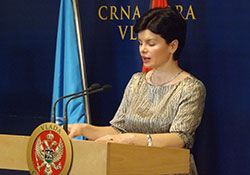Montenegro points to increasing threat of vector-borne diseases on World Health Day

WHO
World Health Day 2014, with the theme “Small bite, big threat”, aimed to raise public awareness about the potential economic and health effects of vector-borne diseases.
The Ministry of Health and the WHO Country Office in Montenegro organized a joint press conference on 7 April, highlighting the importance of preventive measures in combating vectors and vector-borne diseases and their increasing prevalence.
In opening remarks, Ms Mina Brajovic, Head of the WHO Country Office in Montenegro, explained that although many of these diseases are preventable, they cause more than 1 million deaths worldwide annually. In Europe alone, there were over 1.5 million registered cases of vector-borne diseases in the period 1990 to 2010.
Increasing trend
Ms Brajovic warned that some vector-borne diseases not typically present on the European continent have emerged in Europe and neighbouring countries in recent years: “Available data are alarming since they indicate the potential for vector-borne diseases to spread further and become more frequent in Europe.”
Dr Mira Jovanovski Dasic, Deputy Minister of Health, stated that the proportion of Montenegrin patients with vector-borne diseases in 2013 was 0.2 % out of the total number of patients suffering from infectious diseases. Dr Senad Begic, an epidemiologist at the Institute for Public Health of Montenegro, confirmed that according to preliminary data 13 cases of vector-borne diseases were registered last year in Montenegro: 1 case of imported malaria, 4 cases of Lyme disease, 4 cases of Leishmaniasis and 4 cases of West Nile fever.
New regional framework to address vector-borne diseases
In late 2013 WHO/Europe in cooperation with the European Commission, the European Mosquito Control Association (EMCA) and the European Centre for Disease Prevention and Control (ECDC) adopted the 7-year "Regional framework for surveillance and control of invasive mosquito vectors and re-emerging vector-borne diseases". Its goal is to assist Member States in:
- the development of national operational plans;
- harmonization of these plans and approaches between countries; and
- better coordination of cross-border action to combat vector-born diseases.



